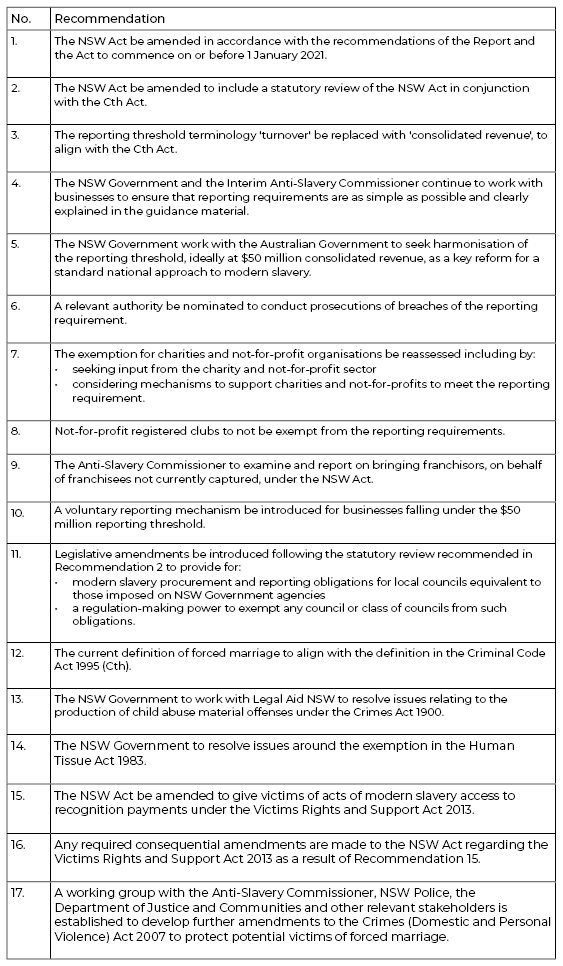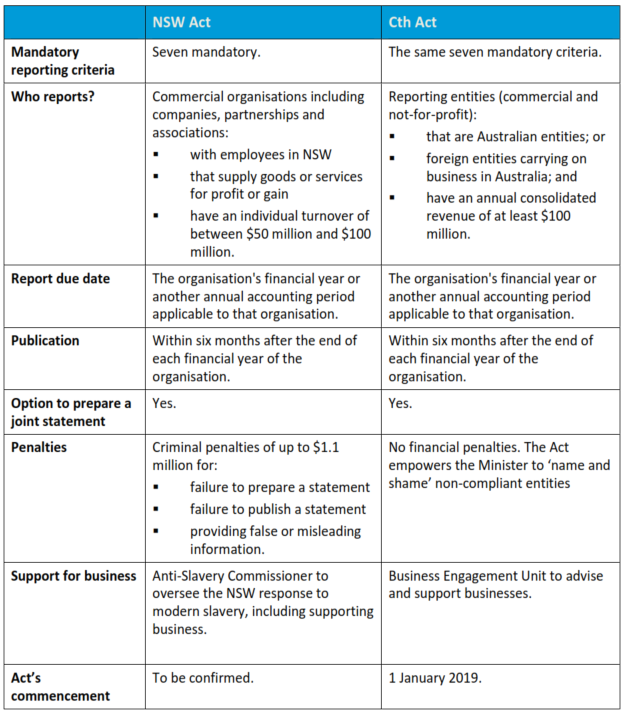- within Law Practice Management, Antitrust/Competition Law and Energy and Natural Resources topic(s)
- with Senior Company Executives, HR and Finance and Tax Executives
- with readers working within the Environment & Waste Management and Property industries
NSW Modern Slavery Act – where to next? Long-awaited report finally released
On 25 March 2020, the NSW Parliament Legislative Council Standing Committee on Social Issues (Committee) handed down its long-awaited report on the Modern Slavery Act 2018 (NSW) (NSW Act), the consultation draft of the Modern Slavery Bill 2019 (amendment Bill), and the consultation draft of the Modern Slavery Regulation 2019 (NSW) (Regulation) (Report).
Snapshot
Despite expressing its preference for a single uniform framework, the Committee supports the commencement of the NSW Act on or before 1 January 2021.
The Committee made 17 recommendations, including the following key points:
- a harmonised reporting threshold be established across the NSW Act and Modern Slavery Act 2018 (Cth) (Cth Act), ideally at $50 million consolidated revenue
- a voluntary reporting mechanism be introduced for businesses falling under the $50 million reporting threshold – similar to what is in place under the Cth Act
- reporting obligations for local councils be introduced equivalent to those imposed on NSW Government agencies.
The Committee's 17 recommendations are summarised in the below table.

It was pleasing to see that the Report directly referenced and quoted a number of the suggestions and observations put forward in our submission, which can be accessed here.
Set out below is an overview of the timeline and terms of reference of the Committee as well as a deeper dive into some of the key issues the Committee considered.
Overview of timeline
The NSW Act was introduced into parliament as a private member's bill on 8 March 2018. Following amendments in both Houses, the NSW Act was passed on 21 June 2018, but has not yet commenced.
The Commonwealth passed its own Cth Act, which commenced on 1 January 2019. An overview of the Cth Act and requirements are set out here.
The Draft Modern Slavery Amendment Bill 2019 and the Draft Modern Slavery Regulation 2019 were both released in late 2019 to address constitutional issues and other issues with the NSW Act.
The NSW Act was then referred to the Legislative Council Standing Committee on Social Issues on 6 August 2019 and shortly after called for submissions from the public and private sector, which closed on 4 October 2019.
After assessing the 102 submissions received, the Committee held a public hearing on Monday 4 November 2019 at Parliament House in Sydney.
The final Report of the Committee was tabled to Parliament on 25 March 2020.
The NSW Government is required to respond to the Report within six months, by 25 September 2020.
Terms of Reference
The terms of reference for the Committee, and those that were considered by public and private entities who made submissions, were:
- the operability of the proposed anti-slavery scheme
- the effect of the anti-slavery scheme on business, including the supply chain reporting obligations under section 24 of the NSW Act
- the intended application of the anti-slavery scheme with respect to charities and not-for-profit organisations, state-owned corporations and local councils
- the appropriateness and enforceability of Modern Slavery Risk Orders under section 29 of the NSW Act
- the unintended consequences of drafting issues with the NSW Act, including with respect to the Human Tissue Act 1983 (NSW) and the sale and supply of human tissue
- the risk of a possible constitutional challenge to current provisions in the NSW Act due to inconsistencies with the Criminal Code Act 1995 (Cth)
- whether the passage of the Cth Act renders parts or all of the NSW Act unnecessary, or requiring of amendment to address inconsistencies or gaps
- the preferred course of action to address the matters identified
- any other related matter.
Is the NSW Act still necessary?
Whether the Cth Act had made the NSW Act inoperable or redundant was a burning question the Committee considered.
The Report notes that a significant majority of stakeholders expressed the strong view that the NSW Act should be retained due to the following features of the NSW Act that are over and above the Cth Act:
- the establishment of the Anti-Slavery Commissioner, a critical and independent role encompassing monitoring, advocacy, industry and government capacity building and community awareness
- the supply chain reporting threshold of $50 million to $100 million, which will encompass an estimated 1,650 businesses in addition to those captured by the Cth Act
- the inclusion of penalties for commercial organisations which fail to meet their reporting requirements or which provide false or misleading information in their modern slavery statements
- the imposition of procurement and supply chain reporting obligations on NSW Government agencies
- the creation of new modern slavery offences
- the extension of the victims support and apprehended violence order schemes to victims of modern slavery
- the establishment of a Modern Slavery Committee within the NSW Parliament, tasked with inquiring into and reporting on matters relating to modern slavery.
On the other hand, some stakeholders were in favour of a single nationally consistent framework with one financial threshold.
The Committee noted that while it is preferable to have uniform national legislation, any national legislative regime must be sufficiently robust, and currently, the overwhelming evidence of the inquiry supports the many "world-leading features" of the NSW Act.
If two regimes are retained, will the reporting requirements be the same?
The Committee considered a number of key issues regarding the operation of dual reporting requirements, including the harmonisation of the reporting requirements for statements, the reporting threshold and related terminology, the position of charities, not-for-profit organisations and small businesses, and voluntary reporting.
It has always been the intention of the NSW and Commonwealth regime to have consistent, harmonised reporting requirements and this is reflected in the Draft Modern Slavery Regulation 2019 (Draft Regulation) – under which the NSW Act requirements for a modern slavery statement are identical to the seven mandatory criteria under the Cth Act.
The below table shows a comparison of the NSW and Commonwealth reporting requirements1.
The Draft Regulation, prepared for public consultation, sets out how commercial organisations are to meet the requirements under the NSW Act for preparing and publishing their modern slavery statements, including:
- the mandatory minimum content of statements
- the timing and method of publication of statements
- the preparation of joint statements by groups of organisations
- exemptions from reporting for:
- entities reporting voluntarily under the Cth Act, while retaining penalty provisions in the NSW Act for provision of false or misleading information
- subsidiaries of entities reporting under the Cth Act, while retaining penalty provisions in the NSW Act for provision of false or misleading information
- small businesses with fewer than 20 employees
- charities and not-for-profit organisations.
Can I opt in to the Commonwealth regime to avoid the NSW penalties?
Some, but not all.
As noted above, under the Draft Regulation, if an entity opts in to the Commonwealth regime, it is exempt from the reporting requirements under the NSW Act (meaning the penalties for failing to prepare or submit a statement do not apply) but the NSW Act will retain penalty provisions in the NSW Act for provision of false or misleading information.
Reporting threshold
The Committee received conflicting submissions on the appropriateness of the NSW Act's reporting threshold of $50 million to $100 million.
Some stakeholders argued the lower threshold creates a compliance burden on organisations without the requisite capacity, resources and experience needed.
However, the Committee agreed with the view expressed by numerous other stakeholders that the $50-$100 million threshold be retained on the basis that:
- this was the threshold recommended by the Commonwealth Parliament's Joint Standing Committee on Foreign Affairs, Defence and Trade in their report "Hidden in Plain Sight: An inquiry into establishing a Modern Slavery Act in Australia"
- it is similar to the £36 million (approximately AU$66 million) threshold contained in the Modern Slavery Act 2015 (UK)
- organisations with an annual turnover of over $50 million or more do have the capacity and resources to prepare a modern slavery statement.
Penalties
One of the hottest topics the Committee had to consider was whether the penalties under the NSW Act should be retained, and if so, are they appropriate.
In comparison to the whopping $1.1 million financial penalties available under the NSW Act for failing to prepare or submit a statement, or providing false or misleading information, the mere ability to be "named and shamed" by the Minister is the only 'penalty' for non-compliance under the Cth Act.
This is undoubtedly one of the biggest differences between the two regimes.
Not surprisingly, the Committee received submissions from the business community strongly opposing the imposition of penalties, especially given the lack of penalties under the Commonwealth.
Other submissions in support of penalties argued that a penalty regime is "best global practice" and evidence from the UK supports that a lack of enforcement and penalties led to low compliance under their Act.
Next steps
The NSW Government is required to respond within six months after which we will have clarity on the future of modern slavery in NSW, particularly with respect to the Draft Modern Slavery Amendment Bill 2019 and the Draft Modern Slavery Regulation 2019.
Footnotes
1 Source: Tendered document to the Commission, Professor Jennifer Burn, Interim Anti-Slavery Commissioner, NSW Department of Premier and Cabinet, Draft NSW Modern Slavery Reporting Requirement Guidance Material, July 2019
This publication does not deal with every important topic or change in law and is not intended to be relied upon as a substitute for legal or other advice that may be relevant to the reader's specific circumstances. If you have found this publication of interest and would like to know more or wish to obtain legal advice relevant to your circumstances please contact one of the named individuals listed.
[View Source]

